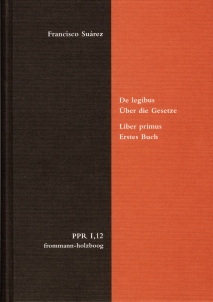You are here
Series » Politische Philosophie und Rechtstheorie des... » Abteilung I: Texte » Francisco Suárez »Francisco Suárez: De legibus ac Deo legislatore. Liber primus. Über die Gesetze und Gott den Gesetzgeber. Erstes Buch
De lege in communi eiusque natura, causis et effectibus. Über das Gesetz im Allgemeinen, seine Natur, seine Ursachen und Wirkungen.
Links / Downloads
Why do societies need laws? By what authority are they legitimized? In the first book of ›De legibus ac Deo legislatore‹ (1612), the summa of his theology of law, Francisco Suárez develops his concept of law in general (lex in commune/natura legis) as well as his general theory of legal validity and obligation. Moreover, he thereby asserts theology’s superior status over philosophy when it comes to questions of practical reason. Suárez manages a critical revision of the theories of law that have been presented by Thomas Aquinas and Duns Scotus and thus a specific mediation between intellectualism and voluntarism. The first volume of ›De legibus‹ – constitutive for the entire oeuvre – is a document of a genuinely original theology of law, whose reception and critique should be influencing the early modern development of political theory until the 18th century, and is made accessible with a complete German translation and an extensive introduction for the first time.
Reviews
»In Germany, Italy, Spain, and recently in the USA as well, Francisco Suárez is undergoing a remarkable renaissance. After decades of ignoring this brilliant early modern Jesuit, it is philosophers and jurists in particular who are rediscovering him. The German ethicist N. Brieskorn, SJ, has dedicated his life’s work to making Suárez’s groundbreaking works better known in his field, and this volume proves once more how right he was. [...] I can only hope that now theologians, and not just philosophers, will return to Suárez and see the great riches of his thought, and realize that much of the criticism of his work relies on polemics rather than an engaged reading of his texts.«
All volumes
- De pace. De bello. Über den Frieden. Über den Krieg. – available
- De legibus ac Deo legislatore. Liber tertius. Über die Gesetze und Gott den Gesetzgeber. Drittes Buch. Teil I – available
- De legibus ac Deo legislatore. Liber tertius. Über die Gesetze und Gott den Gesetzgeber. Drittes Buch. Teil II – available
- De legibus ac Deo legislatore. Liber secundus. Über die Gesetze und Gott den Gesetzgeber. Zweites Buch – available
- De legibus ac Deo legislatore. Liber primus. Über die Gesetze und Gott den Gesetzgeber. Erstes Buch – available
- De legibus ac Deo legislatore. Liber quartus. Über die Gesetze und Gott den Gesetzgeber. Viertes Buch – Second half of 2027
- De legibus ac Deo legislatore. Liber quintus. Über die Gesetze und Gott den Gesetzgeber. Fünftes Buch. Teil I und Teil II. – available
- Subject Areas
- New Publications
- ---
- Critical Editions
- Collected Works
- Series
- Arbeiten und Editionen zur Mittleren Deutschen Literatur
- Aufklärung und Revolution
- Böhme-Forschungen
- Bibliothek 1800
- Clavis Pansophiae
- Collegium Philosophicum
- Commentaria in Aristotelem Graeca
- Doctrina et Pietas
- Editionen zur Frühen Neuzeit
- Elea
- Europäische Literatur der Frühen Neuzeit
- exempla aesthetica
- Forschungen und Materialien zur Universitätsgeschichte
- Forschungen und Materialien zur deutschen Aufklärung
- Freidenker der europäischen Aufklärung
- Freud heute
- frommann-holzboog Studientexte
- Fundamenta Historica
- Grammatica Speculativa
- Grammatica Universalis
- Kultur und Gesellschaft
- legenda
- Judith Le Soldat heute
- Medizin und Philosophie
- Melanchthon-Schriften der Stadt Bretten
- Mystik in Geschichte und Gegenwart
- Natur und Philosophie
- Neuzeit im Aufbau
- Philosophie interkulturell
- Philosophische Clandestina der deutschen Aufklärung
- Der Platonismus in der Antike
- Politische Philosophie und Rechtstheorie des Mittelalters und der Neuzeit
- problemata
- Psychoanalysis International
- Quaestiones
- Schellingiana
- Specula
- Spekulation und Erfahrung
- Supplementum Platonicum
- Volksaufklärung
- Werkstatt Bionik und Evolutionstechnik
- Bibliographies and Reference Books
- Allgemeine Zeitschrift für Philosophie
- AZP Beihefte
- Jahrbuch der Psychoanalyse
- JP Beihefte
- Steiner Studies
- Open-Access
- Single volumes
- eBooks
- Special Offers
- ---
- Authors
- Publishing house
- Links / Partner
- Paths to Philosophy
